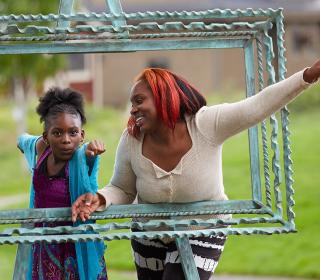Taking Action Against Domestic Violence

For National Domestic Violence Awareness Month, YWCA would like to bring attention to our domestic violence programs. The term “gender-based violence” addresses domestic violence, sexual assault, and commercial sexual exploitation. YWCA takes a specialized approach to offering support of services to survivors with trauma-informed care to support them with overcoming and healing from their abusive relationships. It is our goal to inspire our community to be allies to survivors along with YWCA.
Doris O’Neal is YWCA’s Domestic Violence Program Director. Doris has been working in domestic violence (DV) support services for 25 years in different capacities of advocacy. YWCA became a platform for Doris to continue to serve survivors of gender-based violence with a focus on African American and Black women who are furthest from opportunity and equity.
YWCA’s programs offers trauma-informed, free, and confidential advocacy services in:
- Legal advocacy / legal navigator (Survivors First Program)
- DV Rapid rehousing / shelter / transitional housing
- Assistance with safety planning
- Referrals for basic needs
- Specialized support groups including groups for African American and Spanish-speaking women
- Children and youth services
- Limited financial assistance (move-in costs, utilities, etc.)
- And more
Be an Ally

Here are some tips from our Domestic Violence Program Director on how to support a survivor.
- When seeking to support someone in a DV situation, it is best to avoid asking, “Why don’t you just leave?” Leaving is not always an option. Listen to the expressed needs of the survivor. They know their safety best.
- Help to get someone connected to a DV advocate to work on a safety plan. A safety plan increases their ability to leave an abusive relationship more safely. When a survivor is leaving, that is often the most potentially lethal time. Additionally, a trusted friend to turn to can go a long way for someone experiencing domestic violence.
- Create safe spaces for survivors to speak about their experience with domestic violence. It is difficult to open up, and can be especially hard for women of color to trust others and ask for help. Often times, women of color are not familiar with domestic violence support services.
- Don’t blame the victim. Domestic violence is about power and control over an intimate partner. The abusive partner is to blame.
- Get familiar with resources in your community for women facing domestic violence. In a time of need, these resources can be vital to a victim’s safety, security, and empowerment.
YWCA can’t fight gender-based violence alone. We do our best to bring awareness to the issue and bring aboard advocates to support women in need. We are always in search of a handful of committed and consistent volunteers to be allies to survivors of gender-based violence. Check out our volunteer page to find out more about how to be an ally to women.
If you would like to speak with a DV advocate, please contact YWCA Domestic Violence Advocacy Program at 206.280.9961 or visit our program page for resources.

Kendyl Hardy is the Volunteer Services Coordinator at YWCA Seattle | King | Snohomish. As an avid volunteer herself, Kendyl finds volunteering is a way to grow personally and as a community. Kendyl graduated with a degree in Public Relations with a concentration in nonprofit management. Throughout her college career, she worked to highlight the importance of civic service to sustain society and feature dialogue about issues affecting our communities.
We share the stories of our program participants, programs, and staff, as well as news about the agency and what’s happening in our King and Snohomish community.


